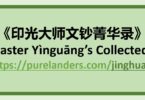
如何自誓受五戒?
[284] How To Personally Vow [To] Receive [The] Five Precepts?
受戒一事,若男子出家为僧,必须入堂习仪,方知丛林规矩,为僧仪则。则游方行脚,了无妨阻。否则十方丛林,莫由住止。
[Of] receiving precepts, [this] one matter, if men leave [the] household [life to] be monks, [they] must enter halls [to] practise [their] ceremonies, then knowing monasteries’ rules, as monks’ code. Then wandering, walking [by] foot, completely without obstructions. Otherwise, [the] ten directions’ monasteries, [will] due [to this], not [allow] residential stay.
[Note 1: Monks’ code (僧仪则) are monastic precepts (出家戒). Men at home (在家男子) (householders) should receive lay precepts (在家戒) like the Five Precepts (五戒) at proper Buddhist temples and centres too, if possible, unless unable to. This is so as the more formal the ceremony for receiving precepts is, as conducted by monastics, and participated in sincerely, the more deeply will the precepts be received in the heart and mind, thus having greater commitment.]
若在家女人,家资丰厚,身能自主,诣寺受戒,亦非不可。至于身家穷困,何必如此?但于佛前恳切至诚,忏悔罪业。
If women at home, [are with] family wealth ample, [and are] able [to] decide [for] themselves, [if] visiting monasteries [to] receive precepts, [this is] also not forbidden. As for [those with] themselves and their family poverty stricken, why must [it be] in this way? [They] only [have to], before [the] Buddha [shrine at home, with] earnestness [and] utmost sincerity, repent [their] transgressive karmas.
[Note 2: Due to poverty, some might not be able to travel to distant monasteries to receive the precepts. As this obstacle is due to personal evil karmas, there should be repentance practised. Other reasons that might make travel difficult are being very old, weak and/or sick. If possible, home visits by monastics for conferring precepts can be arranged. Likewise for taking of the Threefold Refuge (三皈依).]
一七日,自誓受戒。至第七日,对佛唱言:「我弟子福贤,誓受五戒,为满分优婆夷。
[For] one [to] seven days, personally vow [to] receive [the] precepts. [Having] reached [the] seventh day, facing [the] Buddha, chant aloud, ‘I, disciple Fúxián [i.e. name to be substituted with one’s own], vow [to] receive [the] Five Precepts, as [an] Upāsikā [or Upāsakā] [with] full marks.
(优婆夷,此云近事女,谓既受五戒,堪事佛故。满分者,五戒全持也。男子受戒,名优婆塞,此云近事男。编者敬注)
([On an] Upāsikā, this [is to] say, [a] female layperson, calling [one who has] already received [the] Five Precepts, capable [of] serving [the] Buddhas thus. Those [with] full marks, [are with the] Five Precepts completely upheld. [A] man [who] received [the] precepts, [is] named [as an] Upāsakā. This [is to] say, [a] male layperson. [By the] compiler-editor respectfully annotated)
尽形寿不杀生,尽形寿不偷盗,尽形寿不淫欲(若有夫女,则曰不邪淫),尽形寿不妄语,尽形寿不饮酒。」
[1] [To the] end [of this] life, [I will] not kill lives. [2] [To the] end [of this] life, [I will] not steal. [3] [To the] end [of this] life, [I will] not [have] sexual desires. (If [there] are women [with] husbands [or men with wives], then say “not [have] sexual misconduct.”) [4] [To the] end [of this] life, [I will] not [have] false speech. [5] [To the] end [of this] life, [I will] not drink alcohol.’
[Note 3: To receive the Five Precepts (五戒) is to commit to (i) not killing lives (不杀生), (ii) not stealing (不偷盗), (iii) not having sexual misconduct (邪淫), (iv) not having false speech (妄语) and (v) not taking intoxicants (饮酒).]
如此三说,即为得戒。
Like this thrice spoken, [one is] considered to [have] attained [the] precepts.
[Note 4: Reciting thrice is to confirm, reconfirm and conclusively confirm commitment. This facilitates receiving of the precepts in the heart and mind more deeply.]
但自志心受持,功德并无优劣。切勿谓自誓受戒者,为不如法。此系《梵网经》中如来圣训。
Only [with] one’s sincere mind receiving [and] upholding [them, the] meritorious virtues [are] equal, without [those] better [or] worse. There] must not [be] calling those [who] personally vow [to] receive precepts, as [those] not according [with the] Dharma. These [are] all [from the] Brahmā Net Sūtra within, [with the] Thus Come [One’s] sagely instructions.
[Note 5: If there is lack of sincerity, those who receive the precepts at Buddhist temples and centres might be ‘worse off’, than those who personally receive them at home sincerely.]
净土宗十三祖印光大师
Pure Land Tradition’s 13th Patriarch Great Master Yìnguāng
《印光法师文钞》(正编):与徐福贤书;
Dharma Master Yìnguāng’s Collected Writings (First Compilation): Reply Letter For Xú Fúxián;
印光大师文钞菁华录(第两百八十四则):八、释普通疑惑:论戒律(第四则)
Record [Of] Great Master Yìnguāng’s Collected Writings’ Essence (284th Short Section): 8th [Chapter]: Explanations [On] Common Doubts [And] Confusions: Discussions [On] Precepts [And] Rules (4th Short Section)
[Ref: #284 / 8.4]
Namo Amituofo : Translation and notes by Shen Shi’an
下一部分
Next Part:
人死神明不灭,善恶果报不虚
[285] People Deceased Are With Consciousnesses Not Ceasing, While Good And Evil Fruits’ Results Are Not False
https://purelanders.com/2025/06/13/285-people-deceased-are-with-consciousnesses-not-ceasing-while-good-and-evil-fruits-results-are-not-false
上一部分
Previous Part:
为何受三皈持五戒?
[283] Why Take The Threefold Refuge And Receive The Five Precepts?
https://purelanders.com/2022/10/28/283-why-take-the-threefold-refuge-and-receive-the-five-precepts
完整典籍
Complete Text:
《印光大师文钞菁华录》
Record Of Great Master Yìnguāng’s Collected Writings’ Essence
https://purelanders.com/jinghualu




